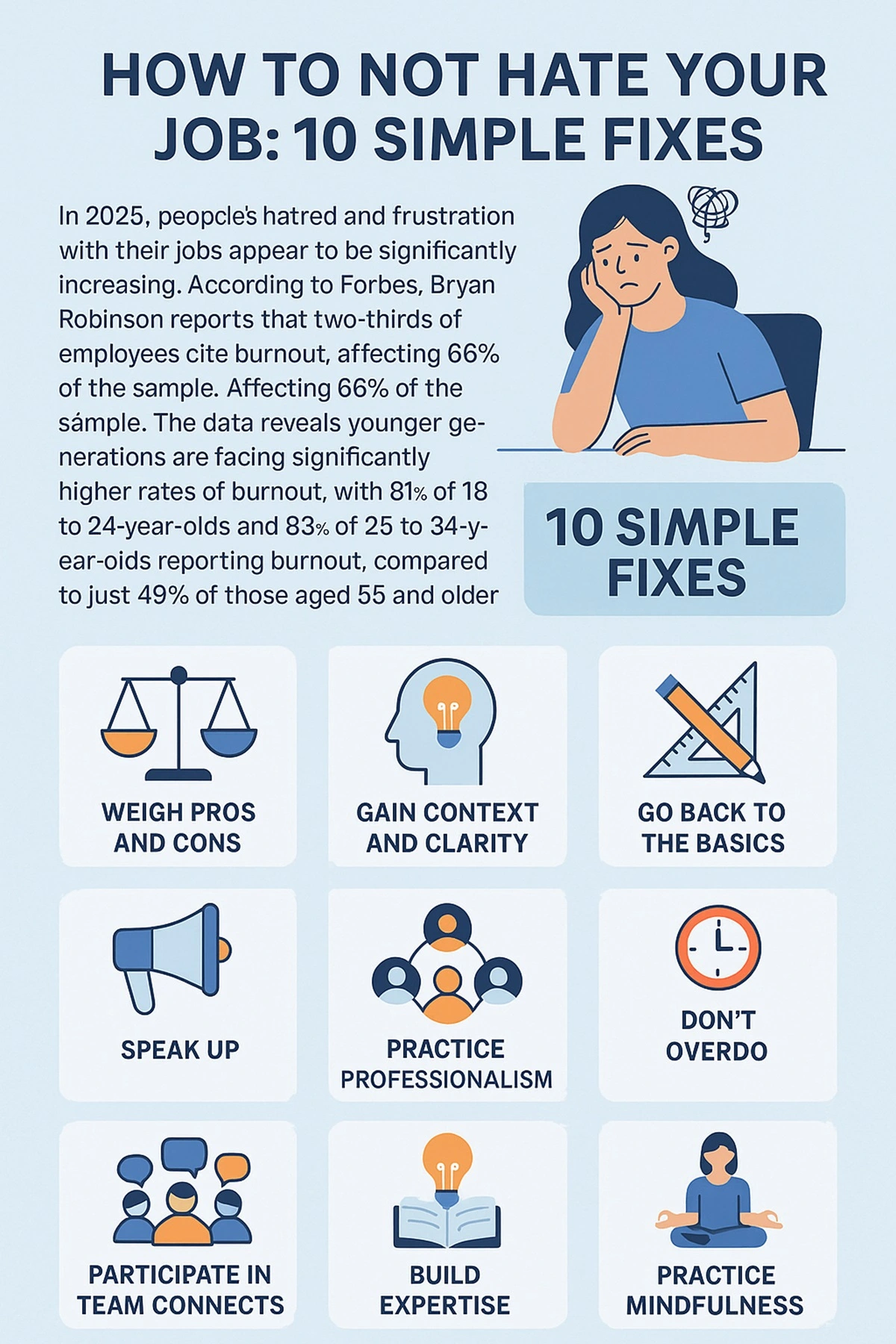In 2025, people’s hatred and frustration with their jobs appear to be significantly increasing. According to Forbes, Bryan Robinson reports that two-thirds of employees cite burnout, affecting 66% of the sample. The data reveals that younger generations are facing significantly higher rates of burnout, with 81% of 18 to 24-year-olds and 83% of 25 to 34-year-olds reporting burnout, compared to just 49% of those aged 55 and older.
Given the data above, providing a simple and accurate answer to the question, “How to not hate your job?” is no easy task. I am a working professional and have been working in the finance industry for over 10 years. Naturally, this question must have crossed your mind at some point too, just like it did mine—and that’s probably why you’ve landed on this article today.
Well, you’ve certainly landed on the right blog. Here, I’ll share 10 simple yet effective ways, based on my personal experience, that can help you feel more involved in your job rather than hating it. I personally apply these strategies in my career, and each one is backed by authoritative and trustworthy facts and studies recommended by experts themselves. So, let’s explore these 10 practical ways to help you answer – How to Not Hate Your Job?

How To Not Hate Your Job: 10 Simple Fixes
Weigh Pros and Cons
The first step I would recommend is to ensure that, before you start hating your job, you have clearly understood both the positives and negatives associated with it. According to SEEK.com, sometimes getting upset with your job is a sign of dissatisfaction that helps you learn your own priorities and build patience, preparing you mentally for a more fitting role.
However, Job dissatisfaction can also have negative impacts on your mental health and body, which can affect your mood, health, and immune response, which can affect your interactions with family, friends, and peers. (humanresourcesonline.net)
That’s why, as I mentioned in my article What To Do When You Hate Your Job? the very first thing you need to do is stay calm and note down the positive and negative aspects of your job on a piece of paper. While listing the pros and cons, there should be no confusion in your mind—your thoughts should flow clearly and objectively.
The benefit of this activity is that you’ll be able to identify certain reasons that, although not directly related to your job dissatisfaction, still have a deep impact. By working on these underlying factors, your tendency to hate your job may significantly reduce.
Gain Context and Clarity
Often, a major reason why people feel hatred or dissatisfaction toward their job is due to a lack of clarity and context about their job role. Many individuals simply don’t know what exactly they’re supposed to do or what is truly expected from their role.
As per AP News, just under half of U.S. employees who participated in a Gallup survey in November “strongly agreed” that they know what is expected of them at work, which is one of the factors the polling firm uses to measure employee engagement. In January 2020, the figure stood at 56%. Moreover, A vorecol study found that nearly 70% of employees feel unsure about what is expected of them in their roles. This lack of clarity can create a ripple effect of confusion and decreased productivity.
It is fair to say that a clear understanding of the role will not only help you understand your responsibilities better but will also boost innovative work behaviour. Whenever you’re unsure, it’s a good practice to ask for clarity and context regarding the task or job you’re currently handling. This helps ensure that you meet the expectations of your role. I personally follow this in my day-to-day work to avoid unsatisfactory performance outcomes.
Go Back to the Basics
In my opinion, when it comes to gaining contextual clarity, going back to the basics should be the first impactful step. Often, we tend to skip the fundamentals and start chasing high-level concepts directly. As a result, our focus shifts solely to completing the task, without truly understanding why we are doing it in the first place.
As per the article on Sage.com, domain knowledge gained during a job directly boosts job satisfaction, especially in larger organizations. Also, as per ResearchGate, research conducted with a sample of workers in Indonesia shows that higher competency and structured career paths significantly improve job performance and, by extension, job satisfaction.
Lord Mark Price has also rightly pointed out in his article that a structured approach to career development is required for higher job satisfaction, retention, and performance. This structured career starts from mastering the basics and then climbing to advanced levels.
Speak Up
I believe many people feel frustrated with their jobs because either they aren’t able to express their thoughts openly, or they aren’t given the opportunity to do so. A New research by Duanyi Yang (Cornell/ILR) surveyed American employees on the voice gap, which measures a worker’s perceived gap between desired and actual influence at work. The findings were very straightforward,” Yang said. “A voice gap is significantly associated with lower job satisfaction and well-being, as well as higher burnout and turnover intention.”
So, when you learn to express your thoughts openly and actively participate in key conversations, you will naturally start developing a passion for your job, and over time, your hatred for it will begin to transform into dedication.
Connect with Leaders
In my opinion, having skip-level connects—that is, interactions with leaders above your immediate manager—is essential to understanding the broader objectives of your work and how they align with senior leadership’s goals. I often use these connect sessions to build rapport with senior leaders and gain insight into their focus areas. This helps me understand how well the work I’m doing aligns with their objectives. This clarity allows me to see how impactful my contributions truly are.
A longitudinal NCBI study found that engaging leadership is associated with increased perceptions of intrinsic organizational values (e.g., providing a contribution to organizational and personal development) and satisfaction of the need for autonomy, which, in turn, may boost employees’ level of engagement. It could boost the effects of human resource (HR) practices for promoting employees’ psychological, physical, and social well-being over time.
Practice Professionalism
Even if you’re frustrated with your job, that frustration and negativity should never affect your professional conduct or work environment. You must always maintain professionalism and handle your job responsibilities responsibly. Remember, you are being paid to play a specific role in the company, and you should respect that role, because it’s what supports your livelihood.
Professionally, your behavior and workplace ethics matter just as much, if not more than your performance. Organizations like WebHR and All Things Talent emphasize that respectful, collaborative, and positive behaviors are foundational: they build morale, reduce turnover, and ultimately drive productivity and retention, often more so than individual results (perkbox.com).
Must Read: Job Hate and Dissatisfaction in 2025 – 10 True Reasons Revealed
Don’t Overdo
I used to believe that working longer hours would earn me more appreciation, a quicker promotion, and a better salary hike—but I was wrong. This is a common misconception among many professionals. Not only does it negatively impact their work-life balance, but it also increases their hatred toward their job. It’s often said that working more doesn’t lead to rest—it only leads to more work. That’s why it’s better to maintain a healthy work-life balance alongside your professional responsibilities.
Dr. Christina Maslach of UC Berkeley warns that the impact of chronic overload can be far-reaching health of employees and organizations. It can lead to leads to burnout, anxiety, insomnia, poor self‑care, and rising physical health issues. (health.calm.com)
Participate in Team Connects
Team social connects are a great way to reduce job frustration. I’ve personally realized that these informal interactions with teammates help build a deeper bond, allowing you to connect beyond just work discussions. It’s important to understand that just like you have a personal life, you also have a professional life, and embracing it as an important part of your overall life is essential for long-term job satisfaction.
Teamland reveals that 76% of U.S. workers who have close friends at work say it makes them more likely to remain with their employer. 85% of these workers feel their friendships have positively impacted their career, highlighting how essential social connections are to personal and professional growth.
Build Expertise
Another effective way to reduce job hate and frustration is by building expertise in your work. When we start immersing ourselves in what we do, we naturally begin to feel more interested and engaged. However, expertise isn’t gained by just doing day-to-day tasks—it also requires pursuing advanced certifications and undergoing relevant training.
A 2025 Devlinpeck study found that 92% of employees think workplace training impacts their job engagement positively, and 68% of employees prefer to learn or train in the workplace. Moreover, LinkedIn Learning’s 2025 report shows 84% of employees feel learning adds purpose and accelerates their careers.
Practice Mindfulness
Lastly, practicing Mindfulness is a therapy for job stress and dissatisfaction. A new study conducted by researchers at the University of California, San Francisco, examined the impact of a commercially available digital meditation platform, Headspace, on over 1,400 UCSF employees. It was found that significant, sustained improvements in well-being, job enjoyment, and mindfulness, particularly for those who meditated more,” said Rachel Radin, PhD, a psychologist and assistant professor of psychiatry at UCSF. (ems1.com)
Mindfulness meditation has emerged as a promising tool to mitigate these challenges by fostering present-moment awareness and self-regulation.
Conclusion
To conclude, in 2025, numerous cases and reports of job frustration and burnout are emerging, making it more important than ever to approach such situations with patience. Even if your job doesn’t feel exciting to you, it’s essential to look beyond that and focus on the positives it offers.
Gaining contextual clarity about your role and building expertise in your field are some of the key ways to reduce job-related frustration. At the same time, team social connections and leadership interactions can also be powerful tools to help you develop a stronger bond with your work.
I hope you found this article helpful. If you did, please consider sharing it with your friends and peers. And don’t forget to follow Synched Harmony for more valuable content like this.

Greetings! I am the voice behind the thoughts presented on Synched Harmony. As an ordinary individual, I strive to live a life dedicated to achieving inner peace and serenity by cultivating harmony within and making difficult aspects of life work together in sync during tough phases of life. Life becomes much easier if we open ourselves to small changes and respect each other’s personal boundaries, creating space for shared happiness.

